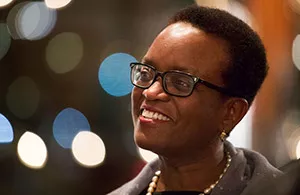Q&A with President Valerie Smith on Leadership, Her First Year at Swarthmore

NBC 10: 10 Questions With Val Smith, President of Swarthmore College
Valerie Smith (but please call her Val) is into her second year now as President of Swarthmore College. Brooklyn-born, she is the daughter of career educators – her mother is a retired elementary school teacher and her father taught biology. Smith is a Phi Beta Kappa graduate from Bates College who did her graduate and doctoral work at the University of Virginia before launching a teaching career that distinguished her as scholar of African American history and culture. Smith’s time as a teacher spans more than 30 years spent at Princeton, UCLA and then back to Princeton where she was both Professor of English and African-American studies and Dean of the College before taking the Swarthmore position.
If you were doing a self-assessment on your first year at Swarthmore, what are your key accomplishments, and what is your one skill or goal you’re really going to work on?
I would say I think one of my biggest accomplishments this year has been my efforts to reach out and get to know as many people as I have, both across the campus and the region and getting to know alumni. And I have really, really enjoyed that work immensely. And I have done that in a number of ways, attending student functions and inviting people into the president’s house.
One of my challenges for the future is figuring out time management. I’m going to have to figure out how to dedicate more time to the tough priority issues and figure out what I can delegate. I think this year I really tried to do everything, and that’s not sustainable.
People -- colleagues, students and frankly, strangers -- have talked about you being such a great listener. What can the rest of us learn from that virtue?
Well, I think, number one, I think my ability to listen grew out of my teaching style. And so that was valuable to me because it sort of links my academic life with my administrative life. What I think motivates us to some degree is a sense that we make every effort to respect the opinions and ideas of our interlocutors, even if we think we have nothing in common with them. And so I think the first step in the ability to have dialogue, really, and then to help share in solutions is to be able to listen to people. And certainly there are times when I think I don’t want to listen to what other people have to say but I have to remind myself that however right I may think I am about a particular issue, there was usually always something I can learn if I let myself listen to what other people have to say and understand how they arrived at that opinion, an opinion I might not agree with. And also to be open to the possibility that one’s deeply-held opinion might change or be modified or gain nuance if one is able to enter into conversation with other people.
And then, I just tend to find other people endlessly interesting and so while learning to listen is a discipline, it’s also endlessly a pleasure, so I really enjoy it.
What do you feel you’re most passionate about?
I think I’m probably most passionate about ensuring we create opportunities for everyone, wherever they find themselves, to feel that they are at home in their world and they feel they are highly valued for what they bring to their environment. And so I think that manifests itself in my work in terms of trying to create an inclusive community on our campus, one where whatever one’s station – a student, a faculty member, a staff person – one feels valued, and that one makes important contributions to their life and campus and that we’re always learning. And then I think in my own life, it means an enormous amount to me to be able to find my place and to feel at home in whatever world I occupy.
Valerie Smith, a distinguished scholar of African-American literature, is the 15th president of Swarthmore College. Upon her arrival at Swarthmore, she identified several priorities, among them attracting more low-income and first-generation students and providing for them an exceptional undergraduate experience. She is also strongly committed to curricular innovation and to strengthening relationships between the College and the region.



